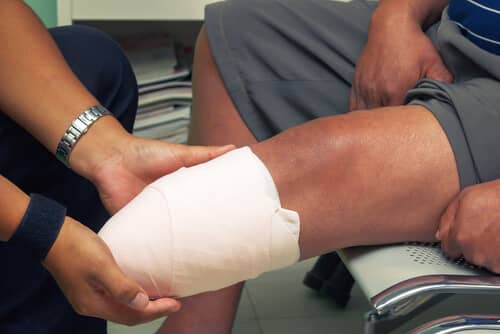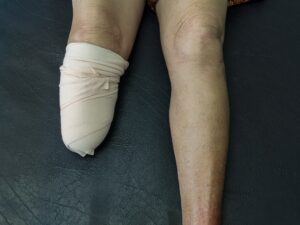
Chicago Amputation Attorney
An amputation is a catastrophic injury involving the loss of a limb, digit, or another body part. An amputation can occur due to a traumatic injury or may be carried out intentionally by surgically removing body parts to prevent infection, disease, or death.
In many cases, amputation injuries are caused by preventable accidents. When an amputation occurs as the result of someone else’s negligence, amputees have the right to demand compensation for their losses in a personal injury claim.
If you have suffered the loss of a limb, you may be feeling blindsided and unsure of how you’ll put your life back together. The personal injury lawyers of Salvi, Schostok & Pritchard P.C. can help. Contact us today to discuss the details of your case in a free case review with a qualified Chicago amputation lawyer.
Get help from the nearest personal injury attorney in Chicago
Types of Amputation
 Amputations are typically categorized based on which body part or parts are affected and how the amputation occurred. The main types of amputations include:
Amputations are typically categorized based on which body part or parts are affected and how the amputation occurred. The main types of amputations include:
- Traumatic amputations – A traumatic amputation occurs when a body part is removed because of a traumatic or violent event, such as a motor vehicle collision or accident involving heavy machinery. Traumatic amputations often involve significant blood loss, which can be life-threatening.
- Surgical amputations – A surgeon may perform a surgical amputation to remove body parts that are diseased, infected, or too damaged to be repaired. Physicians only recommend surgical amputations as a last resort, such as when a patient’s bodily function or life is on the line.
- Upper limb amputations – Upper limb amputations involve the partial or complete removal of the shoulders, arms, elbows, hands, wrists, or fingers.
- Lower limb amputations – Lower limb amputations involve the partial or total removal of the pelvis, legs, feet, knees, ankles, or toes.
Causes of Amputation
Amputations can occur as a result of:
- Disease – Vascular disease, diabetes, and other conditions associated with blood clots can cause necrosis, a type of tissue death that can lead to limb loss.
- Traffic accidents – A motor vehicle accident can result in crushing, pinning, or other traumatic injuries that directly remove limbs or damage them to the point of requiring surgical removal.
- Burns – Severe, deep burns can injure the skin and the underlying tissues badly enough that body parts must be removed.
- Infections – If an infection is serious and does not respond to antibiotics or other types of treatment, an amputation may be necessary to prevent the spread of infection.
- Frostbite – Frostbite occurs due to exposure to extremely low temperatures, leading to permanent damage to the skin and underlying tissue.
- Machinery accidents – Those who operate heavy equipment sometimes have digits or limbs amputated as a result of malfunctions, defects, or user error.
- Surgery – Surgical amputation may be necessary when trauma, disease, or infection render a body part too damaged to save by other medical means.
Common Complications of Amputations
Amputations are some of the most traumatic physical injuries that can occur. Amputees are at risk of serious complications, such as:
- Edema – Edema, the medical term for swelling, occurs when fluid from small blood vessels leaks into surrounding tissues. Amputees can experience edema when amputation sites are injured or inflamed.
- Infections – Surgical or traumatic amputations leave patients with large wounds that are prone to infection in the absence of proper hygiene or skincare.
- Muscle and joint weakness – Some amputee patients are forced to rely on new muscle groups to compensate for losing a limb, leading to stiffness, weakness, and pain.
- Phantom limb pain (PLP) – PLP is a pernicious type of neuropathic pain that feels like it comes from amputated body parts that are no longer present.
- Post-traumatic stress disorder – No matter the cause, an amputation is a traumatic experience. Amputees frequently require emotional support and therapy to cope with grief over their loss and adjust to a new body image.
Potential Financial Recovery for Amputations Caused by Negligence
If you suffered the loss of a limb or other body part due to someone else’s negligence, you could be entitled to compensation for your physical, financial, and emotional losses. No amount of money could ever make up for such a substantial loss, but fair compensation can help you pay for the treatment and lifestyle changes you need to adjust and heal.
Several factors may influence the amount of compensation you could recover from an injury claim or personal injury lawsuit, including:
- Previous and ongoing medical costs associated with the amputation injury
- Projected future costs you will likely incur as a result of the amputation injury
- Incidental expenses such as costs of transportation or prosthetic limbs
- Lost wages if you were forced to miss time at work due to your injury
- Lost earning potential, if your injury prevents you from returning to your usual job
- The subjective costs of your physical pain, emotional suffering, and losses in your overall quality or enjoyment of life
Filing an Amputation Lawsuit
If another person or entity was responsible for causing your unintentional amputation, an attorney can help you file an amputation lawsuit to obtain compensation. The following parties may be partially or fully liable in an amputation injury case:
- At-fault car or truck drivers in a motor vehicle accident
- Manufacturers of dangerous products or equipment
- Negligent healthcare professionals guilty of medical malpractice
- Negligent dog owners whose pets attack and injure others
- Property owners who fail to keep their premises safe for visitors
How Our Amputation Attorneys Can Help You
For more than 40 years, the personal injury attorneys of Salvi, Schostok & Pritchard P.C. have dedicated themselves to serving injured victims throughout Chicago and surrounding areas in Illinois. Our tenacity and extensive experience have allowed us to recover more than $2.5 billion for deserving clients just like you.
We prepare every case we handle as if we were going to trial, and our knowledgeable advocates have a reputation for success both inside and outside the courtroom. Contact us today for a free consultation to learn more about what we can do for you.







